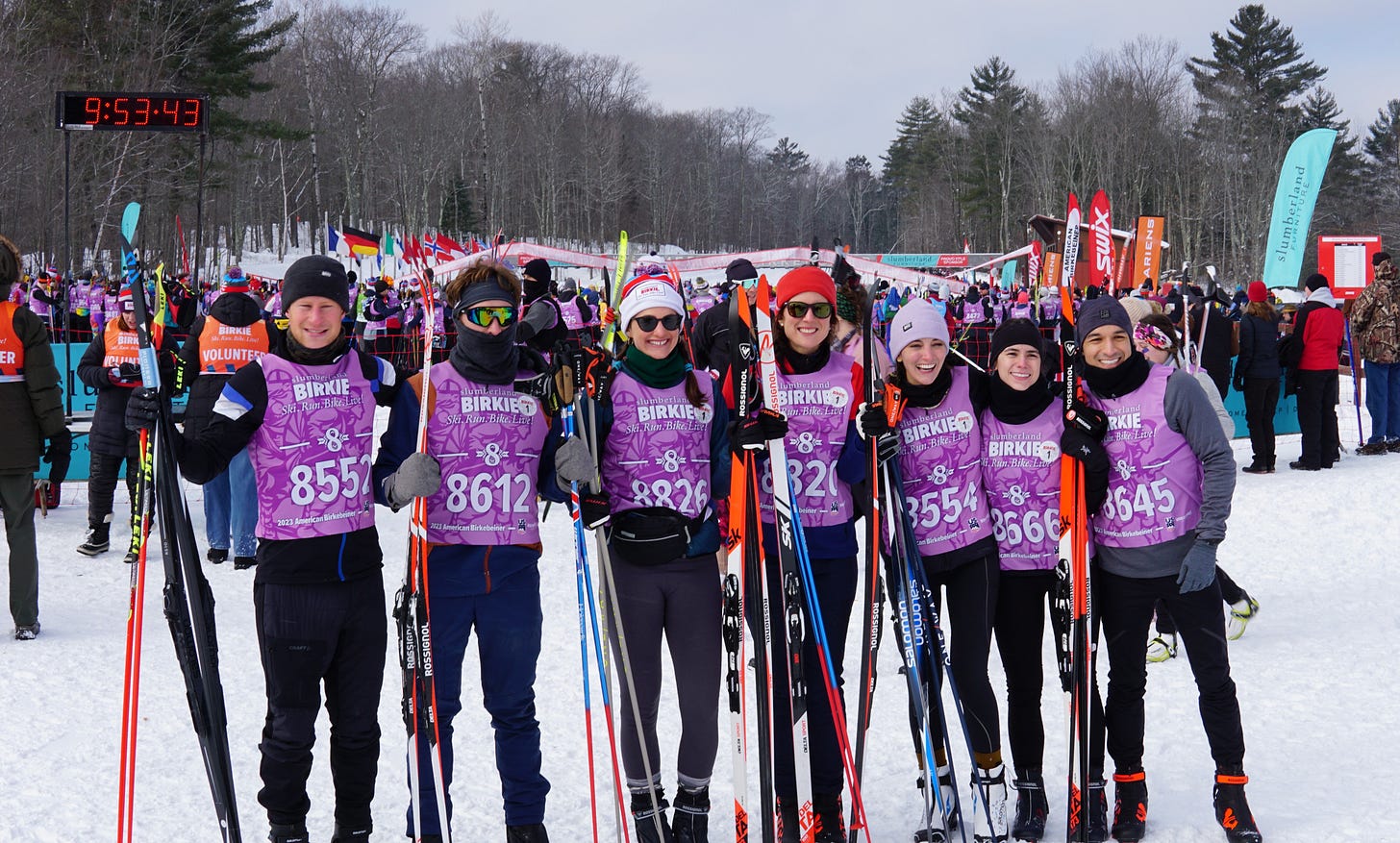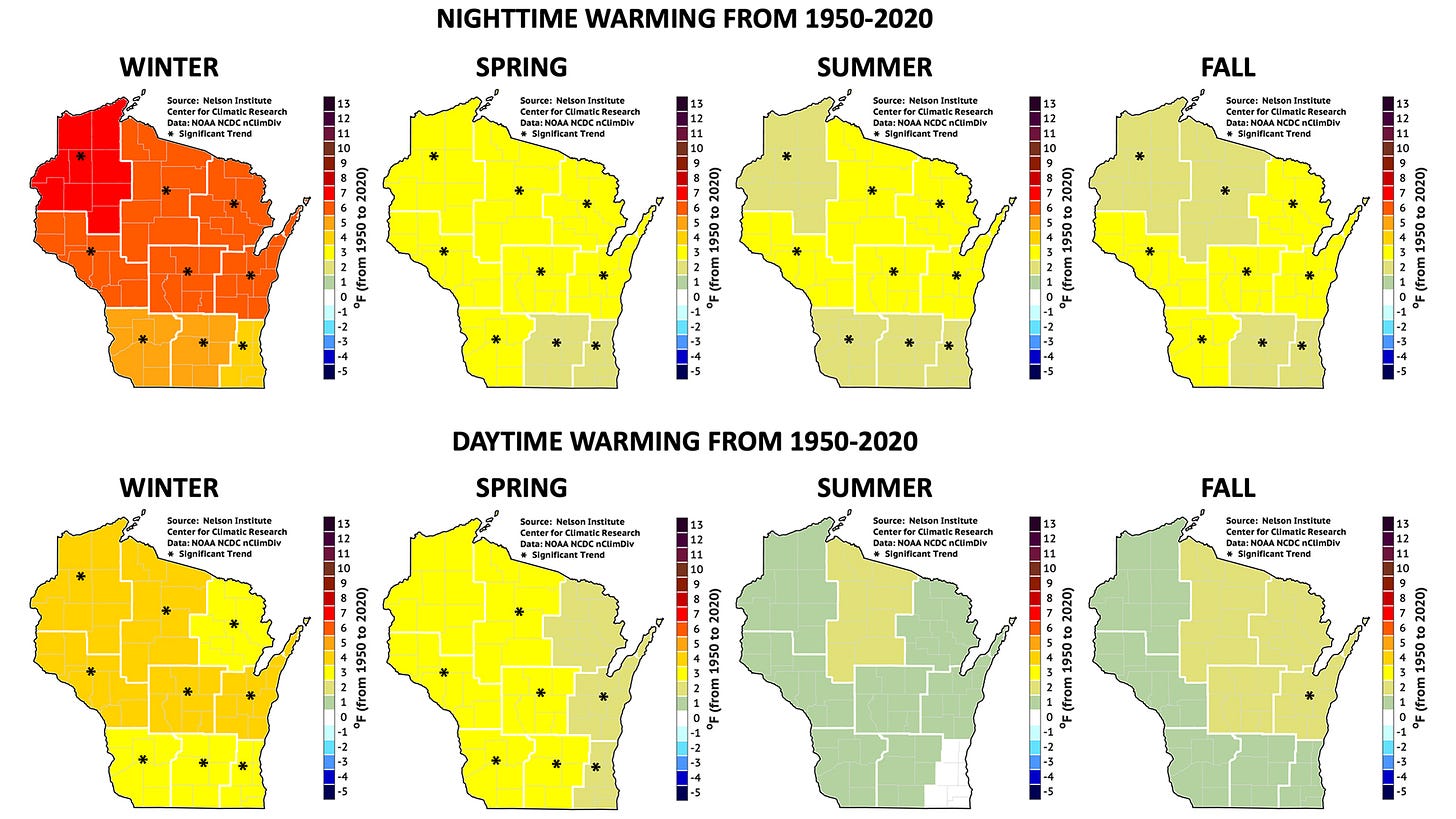News from a Changing Planet --#29--Dispatch from the Frozen North
In which I professionally embarrass myself cross-country skiing
Last month, I barely survived competed in the American Birkebeiner (“the Birkie”) a 50km cross-country ski race across the frozen North Woods in the northwest part of Wisconsin. I thought it would be fun and also a good story about the cultural impacts of climate change. I was half right.

I wrote a story about the experience for Outside magazine, which was published this morning. I hope you will read it — you can find it here: Can A Ski Race With 800 Year Old Roots Survive 21st Century Winters?
I don’t want to give it all away, but there are some important parts of the story that didn’t quite make the final draft that I thought might still be of interest to readers of this newsletter.
One of the reasons I wanted to write about the Birkie is because, while I wasn’t aware of this particular Midwestern phenomenon (thousands of people compete each year, and even more head to this remote part of the state to watch), I had heard about legendary winter races that are facing uncertain futures, and I was interested in writing about them: the Netherlands’ Elfstedentocht, a 200km skating race between 11 towns and cities, which has taken place only 3 times in the last 50 years, most recently in 1997; the Iditarod, which has changed its course to shift north three times, including in 2017; a snow-making factory was built for the Vasaloppet, the oldest and longest cross-country ski race (90km) in the world, which takes place in Sweden every March.

These outdoor events and activities, especially when they reach a certain size, depend on the synchronicity of human time and climate time: the right amount of snow over the right amount of time with the right temperatures on the right date of the year. They rely on a certain narrow band of ranges that have existed during much of the period of time in which people invented skates and skis to move around, and then decided to use them as means to mark human achievement.
But they also help give places their identities, as well as economic boosts. The Birkie alone brings about $20 million to the region. But it’s also a moment that people organize their seasons around; it’s a high point in what can otherwise be a difficult time of year.
So even though I didn’t know about the Birkie, pretty much everyone in Wisconsin does. Everyone I spoke with told me how important being outside in winter is to the culture: cross-country skiing, ice fishing, pond-skating, snowmobiling.
I even talked to the amazing Jessie Diggins, Olympic cross-country skiing champion and advocate for climate action! Read the story to find out what she said!

Carol Barford, a climate scientist and director of the Center for Sustainability and the Global Environment at the University of Wisconsin-Madison, is also a high-school cross country ski coach. “Being outside, doing things like cross-country skiing – that makes it doable to get through the winter,” she said when we spoke recently. Practice that afternoon was canceled because of rain.
“I think that along several axes in Wisconsin there is a feeling of tradition and inheritance, and involving kids in that and teaching them to love to be outdoors,” she said. “That is a big piece of the culture here, along with a character of self-reliance that I think people want to hang onto.”

It’s hard to be surprised by warmer winters at this point — all the trend lines have been pointing in this direction for quite some time. And Wisconsin’s winter this year was snowier than average, though its winters are warming faster than any other season and in the northwest part of the state, fastest of all. New York, where I live, had one of its least snowy winters in recorded history, and the rest of the Northeast didn’t get much more, which made my training difficult.

I had signed up to skate ski the race rather than in the classic style (that’s what the group of friends I was going with had decided to do), but I had never done that before January of this year. I would not recommend this training plan.
However, nothing, but certainly not my training, could have prepared me for the Birkie. To say that I was prepared for the Birkie by four skate-skiing outings is to say that you could learn French by eating steak frites a few times. It’s not going to hurt, but don’t kid yourself.
Still, I harbored secret delusions of athletic grandeur: what would happen if I, someone who once broke an ankle playing leapfrog, somehow turned out to be incredibly good at skate skiing? Part of me believed this might turn out to be true.
I won’t give away the end (my results…) if I haven’t told you already, so head over to Outside to read the story and find out!
And because I couldn’t include the full text of The Snow Man by Wallace Stevens, here it is:
The Snow Man
One must have a mind of winter To regard the frost and the boughs Of the pine-trees crusted with snow; And have been cold a long time To behold the junipers shagged with ice, The spruces rough in the distant glitter Of the January sun; and not to think Of any misery in the sound of the wind, In the sound of a few leaves, Which is the sound of the land Full of the same wind That is blowing in the same bare place For the listener, who listens in the snow, And, nothing himself, beholds Nothing that is not there and the nothing that is.
Tatiana


Regarding your ski across lake Hayward at the end of the race, my daughter - in - law and two sons are the ones on the lake still cheering you on seven-and-a-half hours after you started! After skiing the race themselves (for about the 10th time, in about 3 hours!), they remain on the lake cheering until the last skier finishes! They know the race is harder for those who take 7 1/2 hours than for the winners who do it in 1/3 of that!